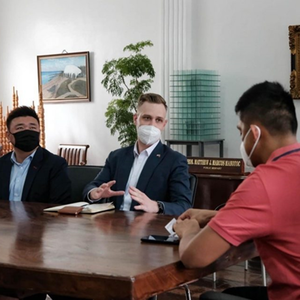USGC helps promote ethanol in the Philippines

SOURCE: Provincial Government of Ilocos Norte
January 24, 2023
BY U.S. Grains Council
The U.S. Grains Council’s Southeast Asia and Oceania office recently spent a week in Ilocos Norte, Philippines, surveying community ethanol development programs and research infrastructure with memorandum of understanding (MOU) partner Mariano Marcos State University (MMSU).
USGC and MMSU – which houses the U.S. Agency for International Development (USAID)-supported National Bioenergy Research & Innovation Centre (NBERIC) – signed an MOU in July 2022 to cooperate on the exchange of knowledge, technical information and best practices related to ethanol industry and policy development in the Philippines.
The visit comprised an assessment of current ethanol research programs at NBERIC, briefings on the university’s bioenergy curriculum, a survey of nipa grass farms used as feedstock sources for community-scale ethanol distilleries and a meeting with Ilocos Norte Governor Matthew Marcos Manotoc to discuss MMSU’s ethanol programs and rural economic development in the province.
Advertisement
“Our visit to MMSU allowed us to view first-hand the impressive work NBERIC has completed to date in promoting bioethanol as a tool to increase rural incomes and better understand where we can best support this programming,” said Chris Markey, USGC assistant regional director for Southeast Asia and Oceania. “USGC is excited to continue this partnership into 2023 as we look ahead to joint programs that will involve a diverse group of bioenergy stakeholders in the Philippines.”
The visit also provided an opportunity for USGC and MMSU to assess potential collaborations on animal feed programming, particularly in the space of education and capacity building at both the university and throughout Ilocos Norte Province.
Advertisement
The Council recently sponsored two MMSU and NBERIC faculty members to take part in a three-week virtual “Ethanol Procurement for Importers” course provided by the Northern Crops Institute (NCI), during which participants attended lectures covering the U.S. corn ethanol industry, sustainability and ethanol policy.
The Philippines continues to be one of the largest export markets for U.S. agricultural and food exports, averaging $3.1 billion annually since 2017. The U.S. ethanol industry is a major servicer for the Philippines, supplying roughly 40 percent of the country’s annual ethanol demand of 170 million gallons (60,283,687 bushels in corn equivalent). The Philippines implemented an E10 mandate in 2011 and is currently evaluating an expansion of the fuel ethanol policy.
Related Stories
Marathon Petroleum Corp. on Aug. 5 released second quarter financial results, reporting improved EBITDA for its renewable diesel segment. The company primarily attributed the improvement to increased utilization and higher margins.
Chevron Corp. on Aug. 1 confirmed the company started production at the Geismar renewable diesel plant in Louisiana during the second quarter after completing work to expand plant capacity from 7,000 to 22,000 barrels per day.
California’s new specified source feedstock attestation requirement: A critical new compliance step for renewable fuel producers
As of July 2025, California’s SCFS requires renewable fuel producers using specified source feedstocks to secure attestation letters reaching back to the point of origin. This marks a significant shift in compliance expectations.
The public comment period on the U.S. EPA’s proposed rule to set 2027 and 2027 RFS RVOs and revise RFS regulations closed Aug. 8. Biofuel groups have largely expressed support for the proposal but also outlined several ways to improve the rulemaking.
The U.S. renewable fuels industry on Aug. 8 celebrated the 20th anniversary of the Renewable Fuel Standard. Federal lawmakers also marked the occasion with resolutions introduced in the House and Senate earlier this month.
Upcoming Events










